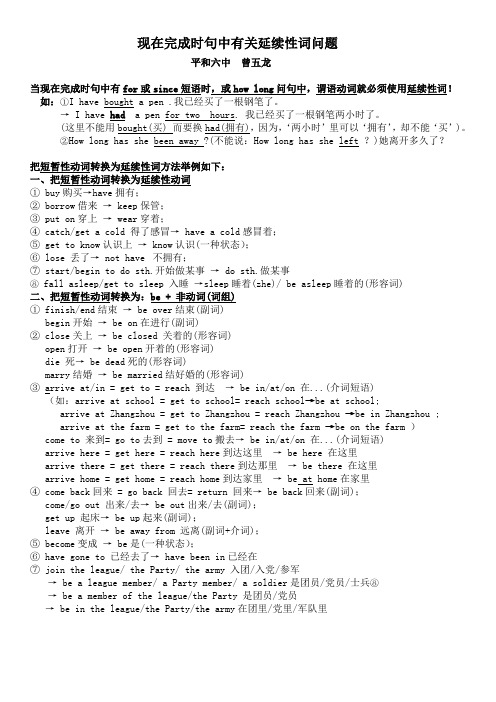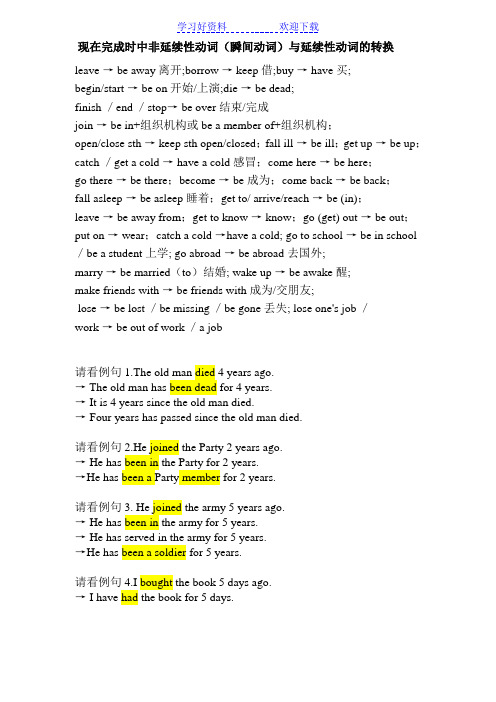现在完成时中常见短暂性动词变延续性动词
- 格式:doc
- 大小:12.00 KB
- 文档页数:1

现在完成时中瞬间动词变延续性动词总结现在完成时中瞬间动词变延续性动词的探讨在日常生活中,我们常常会遇到一些需要表达持续时间的场合,这时候就需要用到延续性动词。
而现在完成时作为一种表示过去发生的动作对现在造成影响的情况,也常常涉及到延续性动词的使用。
那么,如何将瞬间动词变成延续性动词呢?本文将从理论和实践两个方面进行探讨。
一、理论分析1.1 瞬间动词与延续性动词的区别我们需要了解什么是瞬间动词和延续性动词。
瞬间动词是指表示短暂动作的动词,如“吃”、“喝”等;而延续性动词则是指表示持续性动作的动词,如“吃饱”、“喝够”等。
从这个定义可以看出,瞬间动词和延续性动词的主要区别在于动作的持续时间。
瞬间动词的动作持续时间较短,而延续性动词的动作持续时间较长。
1.2 现在完成时与延续性动词的关系现在完成时是用来表示过去发生的动作对现在造成影响的一种时态。
在这个时态中,我们需要使用到延续性动词来表示动作的持续性。
例如,“我已经吃饱了”表示的是过去发生的动作(吃)对现在的影响(已经吃饱了)。
这里的“吃饱了”就是一个延续性动词。
二、实践应用2.1 瞬间动词变延续性动词的方法要将瞬间动词变成延续性动词,我们可以采用以下几种方法:(1) 在瞬间动词后面加上“够”、“了”等词语。
例如,“我已经吃饱了”中的“吃饱了”就是通过在“吃”后面加上“够了”实现的。
这种方法比较简单,但需要注意的是,有些词语并不能直接与瞬间动词搭配,如“看”、“听”等。
这时,我们可以使用“看完”、“听完”等词语来替代。
(2) 将瞬间动词变为动名词。
例如,“我吃完饭就去睡觉”可以改为“我吃完饭后就去睡觉”。
这里,“吃饭”变成了动名词“吃饭”,实现了从瞬间动词到延续性动词的转变。
这种方法适用于大多数情况,但需要注意的是,动名词本身并不具备时态的意义,因此在使用时需要注意上下文的时态。
2.2 现在完成时变延续性动词的例子下面我们通过几个例子来说明如何将现在完成时变为目标时态。

现在完成时延续性与暂短性动词用法编辑整理:尊敬的读者朋友们:这里是精品文档编辑中心,本文档内容是由我和我的同事精心编辑整理后发布的,发布之前我们对文中内容进行仔细校对,但是难免会有疏漏的地方,但是任然希望(现在完成时延续性与暂短性动词用法)的内容能够给您的工作和学习带来便利。
同时也真诚的希望收到您的建议和反馈,这将是我们进步的源泉,前进的动力。
本文可编辑可修改,如果觉得对您有帮助请收藏以便随时查阅,最后祝您生活愉快业绩进步,以下为现在完成时延续性与暂短性动词用法的全部内容。
现在完成时(短暂性动词与延续性动词)的用法基本结构:主语+have/has+过去分词(done)①肯定句:主语+have/has+过去分词+其他②否定句:主语+have/has+not+过去分词+其他③一般疑问句:Have/Has+主语+过去分词+其他④特殊疑问句:特殊疑问词+一般疑问句(have/has+主语+过去分词+其他)(1)现在完成时用来表示现在之前已发生过或完成的动作或状态,但其结果却和现在有联系,也就是说,动作或状态发生在过去但它的影响现在还存在.I have spent all of my money。
(含义是:现在我没有钱花了。
)Jane has laid the table。
(含义是:现在桌子已经摆好了.)Michael has been ill.(含义是:现在仍然很虚弱)He has returned from abroad. (含义是:现在已在此地)(2)现在完成时可以用来表示发生在过去某一时刻的,持续到现在的动作(用行为动词表示)或状态(be动词表示)常与for(+时间段),since(+时间点或过去时的句子)连用.Mary has been ill for three days.I have lived here since 1998.注(超重要):瞬间动词(buy,die,join,lose……)不能直接与for since 连用.要改变动词come-be go out—be out finish-be over open-be opendie—be dead1。

延续性动词与终止性动词:动词按其动作发生的方式,动作发生过程的长短,分为延续性动词和终止性动词。
延续性动词表示的动词是一种延续的动作,这种动词可以延续下去或产生持久的影响。
如:learn,work,stand,lie,know,walk,keep,have,wait,watch,sing,read,sleep,live终止性动词也称非延续性动词、瞬间动词,表示的动作不能延续,即动作发生立即结束,产生某种结果。
在有了某种结果之后,就不能再继续下去。
如:leave,start,set out,arrive,reach,get to,begin,stop,shut,turn off,marry,put,put on,get up,wake,fall,join,receive,finish,end,complete,become,come,go,die,close,open,break,give,jump,buy,borrow等。
1.终止性动词的用法1)终止性动词可用来表示某一动作的完成,因此可用于现在完成时。
如:The plane has arrived飞机到了。
I have finished my homework.我已完成了作业。
2)终止性动词表示的动作极其短暂,不能持续,所以其现在完成时(只限于肯定式)不能和表示一段时间的状语连用。
如:①他死了三年了。
误:He has died for three years.②他来这儿三个月了。
误:he has come here for three months.①②两句中的动词die和come都为终止性动词,它们可用于完成时,但不能同表示一段时间的状语for three years /months连用。
那这两句如何译成英语呢?我们可采用下列方法:A.用能够表示持续状态的相应的延续性动词替换句中的终止性动词。
如:①He has been dead for three years.②He has been here for three months.将短暂性动词改为相应的延续性动词或短语和一段时间连用,其常用的方法有如下几种:a.用相应的延续性动词替换的主要有:buy→have,borrow→ keep,come /go /become→be,catch /get a cold→have a cold,get to know→know等。

现在完成时(短暂性动词与延续性动词)的用法基本结构:主语+have/has+过去分词(done)①肯定句:主语+have/has+过去分词+其他②否定句:主语+have/has+not+过去分词+其他③一般疑问句:Have/Has+主语+过去分词+其他④特殊疑问句:特殊疑问词+一般疑问句(have/has+主语+过去分词+其他)(1))现在完成时用来表示现在之前已发生过或完成的动作或状态,但其结果却和现在有联系, 也就是说,动作或状态发生在过去但它的影响现在还存在.I have spent all of my money.(含义是:现在我没有钱花了.)Jane has laid the table.含( 义是:现在桌子已经摆好了.)Michael has been ill.(含义是:现在仍然很虚弱)He has returned from abroad. 含(义是:现在已在此地)(2)现在完成时可以用来表示发生在过去某一时刻的,持续到现在的动作(用行为动词表示)或状态(be 动词表示)常与for(+时间段),since(+时间点或过去时的句子)连用.Mary has been ill for three days.I have lived here since 1998.注(超重要):瞬间动词(buy,die,join,lose )不能直接与for since 连用。
要改变动词come-be go out-be out finish-be over open-be opendie-be dead1.have 代替buyMy brother has had(不能用has bought) this bike for almost four years.2、用keep或have 代替borrowI have kept(不能用have borrowed) the book for quite a few days.3、用be 替代becomeHow long has your sister been a teacher?4、用have a cold代替catch a coldTom has had a cold since the day before yesterday.5、用wear 代替put onb)用“b+e 形容词”代终止性动词1、be+married 代marry2、be+ill 代fall (get) ill3、be+dead代die4、be+asleep代fall (get) asleep5、be+awake代wake/wake up6、be+gone代lose,die,sell,leave7、be+open 代open8、be closed代close/shut9、be+missing(gone,lost)代losec)用“b+e 副词”代终止性动词1“b+e 2“b+e on”代start,begin up”代get up3“b+e back(to) 代”return to,come back to,go back to4“be here (there代) co”m e(arrive,reach,get) here或go (arrive,reach,get) there等等d)用“b+e 介词短语”代终止性动词1. “be in/at地+点”代替go to /come to2.用be in the army 代替join the army3. “be in/at地+点”代替move to常用瞬间动词变延续性动词表:1. have arrived at/in sw. got to/reached sw. come/gone/moved to sw.→have been in sw./at 相应的介词2. have come/gone back/returned → have been back3. have come/gone out →h e a e v n e o b u t4. have become → have been5. have closed / opened → have been close/open6. have got up →have be;e n up7. have died →have been;dead8. have left sw. → have been away from sw.9. have fallen asleep/got to sleep →have;been asleep10. have finished/ended/completed →have b;een over11. Have married →have been ma;rried12. have started/begun to do sth. →have;done sth.13. have begun → have been on14. have borrowed/bought →have kept/had15. have lost → haven ’t had16. have put on →have worn17. have caught /get a cold →have h;ad a cold18. have got to know → have known19. have/has gone to → have been in20. have joined/have taken part in the league/the Party/the army→have been a member of/ have been in/havbeeen the Party ’s member/the league member/the soldier注意: 1.现在完成时不能单独与准确时间连用,(如表示过去的时间状语)如yesterday(morning、afternoon),last(morning、afternoon)等,除非与for,since 连用.2.现在完成时往往同表示不确定的过去时间状语连用,如already(肯定), yet(否定,疑问), just, before, recently,still, lately 等:He has already obtained得(到获得) a scholarship(奖学金).I haven't seen much of him recently (lately).We have seen that film before.Have they found the missing child yet ?3. 现在完成时常常与表示频度的时间状语连用,如often, sometimes, ever, never, twice等:Have you ever been to BeijingI have never heard Bunny say anything against her.I have used this pen only three times. It is still good.4. 现在完成时还往往可以同包括现在时间在内的时间状语连用,如now, these days/weeks/months/years, this morning/week/month/year, just, today, so f a等r : Peter has written six papers so far.There has been too much rain in San Francisco this year.5. 现在完成时的" 完成用法"现在完成时的" 完成用法" 指的是动作发生在过去某一时刻并已结束,但该动作对现在产生了影响,与现在情况具有因果关系。

现在完成时(短暂性动词与延续性动词)的用法基本结构:主语+have/has+过去分词(done)①肯定句:主语+have/has+过去分词+其他②否定句:主语+have/has+not+过去分词+其他③一般疑问句:Have/Has+主语+过去分词+其他④特殊疑问句:特殊疑问词+一般疑问句(have/has+主语+过去分词+其他)(1)现在完成时用来表示现在之前已发生过或完成的动作或状态,但其结果却和现在有联系,也就是说,动作或状态发生在过去但它的影响现在还存在.I have spent all of my money.(含义是:现在我没有钱花了.)Jane has laid the table.(含义是:现在桌子已经摆好了.)Michael has been ill。
(含义是:现在仍然很虚弱)He has returned from abroad。
(含义是:现在已在此地)(2)现在完成时可以用来表示发生在过去某一时刻的,持续到现在的动作(用行为动词表示)或状态(be动词表示)常与for(+时间段),since(+时间点或过去时的句子)连用。
Mary has been ill for three days.I have lived here since 1998。
注(超重要):瞬间动词(buy,die,join,lose……)不能直接与for since 连用.要改变动词come-be go out—be out finish-be over open—be opendie-be dead1。
have代替buyMy brother has had(不能用has bought) this bike for almost four years。
2、用keep或have代替borrowI have kept(不能用have borrowed) the book for quite a few days。

现在完成时句中有关延续性词问题平和六中曾五龙当现在完成时句中有for或since短语时,或how long问句中,谓语动词就必须使用延续性词!如:①I have bought a pen .我已经买了一根钢笔了。
→ I have had a pen for two hours. 我已经买了一根钢笔两小时了。
(这里不能用bought(买) 而要换had(拥有),因为,‘两小时’里可以‘拥有’,却不能‘买’)。
②How long has she been away ?(不能说:How long has she left ?)她离开多久了?把短暂性动词转换为延续性词方法举例如下:一、把短暂性动词转换为延续性动词① buy购买→have拥有;② borrow借来→ keep保管;③ put on穿上→ wear穿着;④ catch/get a cold 得了感冒→ have a cold感冒着;⑤ get to know认识上→ know认识(一种状态);⑥ lose 丢了→ not have不拥有;⑦ start/begin to do sth.开始做某事→ do sth.做某事⑧ fall asleep/get to sleep 入睡→sleep睡着(zhe)/ be asleep睡着的(形容词)二、把短暂性动词转换为:be + 非动词(词组)① finish/end结束→ be over结束(副词)begin开始→ be on在进行(副词)② close关上→ be closed 关着的(形容词)open打开→ be open开着的(形容词)die 死→ be dead死的(形容词)marry结婚→ be married结好婚的(形容词)③ arrive at/in = get to = reach 到达→ be in/at/on 在...(介词短语)(如:arrive at school = get to school= reach school→be at school;arrive at Zhangzhou = get to Zhangzhou = reach Zhangzhou →be in Zhangzhou ;arrive at the farm = get to the farm= reach the farm →be on the farm )come to 来到= go to去到 = move to搬去→ be in/at/on 在...(介词短语)arrive here = get here = reach here到达这里→ be here 在这里arrive there = get there = reach there到达那里→ be there 在这里arrive home = get home = reach home到达家里→ be at home在家里④ come back回来 = go back 回去= return 回来→ be back回来(副词);come/go out 出来/去→ be out出来/去(副词);get up 起床→ be up起来(副词);leave 离开→ be away from 远离(副词+介词);⑤ become变成→ be是(一种状态);⑥ have gone to 已经去了→ have been in已经在⑦ join the league/ the Party/ the army 入团/入党/参军→ be a league member/ a Party member/ a soldier是团员/党员/士兵⑧→ be a member of the league/the Party 是团员/党员→ be in the league/the Party/the army在团里/党里/军队里按要求把短暂性动词转换为延续性词的练习A.1)He got to Beijing five minutes ago.He ________ _________ _________ Beijing for _________ _________.2)I moved to the USA last year.I ________ ________ __________ the USA since __________ __________.3)I went home yesterday.I _______ ________ _________ home for _________ __________.4)They came here last week.They _________ _________ here since _________ __________.B.1)He came out two years ago.He _________ __________ _________ for __________ __________.2)We return to Fuzhou yesterday.We ________ ________ _________ to Fuzhou since __________.C.1)I became a teacher in 2000.I ________ __________ a teacher for _________ _________.2)The river became dirty last year.The river _________ _________ dirty for _________ __________.D.1)The shop closed two hours ago.The shop ________ _________ _________ for _________ _________.2)The door opened at six in the morning.The door ________ ________ ________ for six hours.E.1)I got up two hours ago.I ________ ________ ________ since ________ ________.2)He left Fuzhou just now.He _______ ________ ________ _________ Fuzhou for five minutes.3)My grandpa died in 2002.My grandpa _______ _______ ________for _______ ________.4)The meeting finished at six.The meeting ________ ______ ______ for six hours.5)I got to sleep two hours ago.I ________ _________ _________ since _________ __________.6)They married in 1990.They ________ _________ __________since _________.F.1)I began to teach at this school in 1995.I ____ ____ at this school since ____.2)The film began two minutes ago.The film ____ ____ ____ for ____ ____.G.1)They borrowed it last week.They _________ _________ it since __________ __________.2)I bought a pen two hours ago.I _________ _________ a pen for ________ __________.3)I got to know him last year.I _________ __________ him since __________ __________.4)I put on my glasses three years ago.I __________ __________ my glasses for _________ _________.H.1)He has gone to Beijing.He ____ ____ _____ Beijing for two days.I.1)He joined the league in 2002.He ________ _________ a _________ _________ for two years.He ________ __________ a __________ ___________ the __________ for two years.He ____________ ___________ ___________ the league for two years.2)My brother joined the army two years ago.My brother __________ __________ a ___________ for ___________ ___________.My brother ___________ ___________ in ____________ ___________ for two years.答案按要求把短暂性动词转换为延续性词(当句中有for或since短语时就必须转换为延续性词) A.1)He got to Beijing five minutes ago. 他五分钟前到达北京的。

现在完成时中瞬间动词变延续性动词总结现在完成时是英语中一种重要的时态形式,用于表示过去发生的动作或事件对现在造成的影响或结果。
在现在完成时中,有两类常见的动词形式,即瞬间动词与延续性动词。
本文旨在总结现在完成时中瞬间动词如何变成延续性动词的规则和特点。
1. 延续性动词的定义:延续性动词表示一个动作或状态在时间上的延续,通常与时间段、频率或者持续性相联系。
例如:live(居住),work(工作),study(学习)等。
2. 瞬间动词的定义:瞬间动词表示一个动作或状态在时间上的瞬间发生,通常没有延续性。
例如:arrive(到达),finish(完成),buy (购买)等。
现在完成时中,将瞬间动词转变为延续性动词的方法如下:1. 加入持续性的时间状语:通过加入表示时间段的状语来表达动作的延续性。
例如:- He has been living in London for three years.(他已经在伦敦居住三年了。
)- She has been studying English since last month.(她从上个月开始一直在学习英语。
)2. 加入频率状语:通过加入表示动作频率的状语来表达延续性。
例如:- They have been playing tennis every weekend.(他们每个周末都在打网球。
)- I have been working out at the gym twice a week.(我每周在健身房锻炼两次。
)3. 加入表示动作状态的状语:通过加入表示动作状态的状语来表达延续性。
例如:- The team has been practicing hard for the upcoming tournament.(这个团队一直在为即将到来的比赛进行努力训练。
)- She has been studying diligently for her exams.(她为了考试一直努力学习。

完成时态瞬间动词变延续性动词规则表延续性动词与终止性动词:动词按其动作发生的方式,动作发生过程的长短,分为延续性动词和终止性动词。
延续性动词表示的动词是一种延续的动作,这种动词可以延续下去或产生持久的影响。
如:learn,work,stand,lie,know,walk,keep,have,wait,watch,sing,read,sleep,live终止性动词也称非延续性动词、瞬间动词,表示的动作不能延续,即动作发生立即结束,产生某种结果。
在有了某种结果之后,就不能再继续下去。
如:leave,start,set out,arrive,reach,get to,begin,stop,shut,turn off,marry,put,put on,get up,wake,fall,join,receive,finish,end,complete,become,come,go,die,close,open,break,give,jump,buy,borrow等。
1.终止性动词的用法1)终止性动词可用来表示某一动作的完成,因此可用于现在完成时。
如:The plane has arrived飞机到了。
I have finished my homework.我已完成了作业。
2)终止性动词表示的动作极其短暂,不能持续,所以其现在完成时(只限于肯定式)不能和表示一段时间的状语连用。
如:①他死了三年了。
误:He has died for three years.②他来这儿三个月了。
误:he has come here for three months.①②两句中的动词die和come都为终止性动词,它们可用于完成时,但不能同表示一段时间的状语for three years /months连用。
那这两句如何译成英语呢?我们可采用下列方法:A.用能够表示持续状态的相应的延续性动词替换句中的终止性动词。
如:①He has been dead for three years.②He has been here for three months.将短暂性动词改为相应的延续性动词或短语和一段时间连用,其常用的方法有如下几种:a.用相应的延续性动词替换的主要有:buy→have,borrow→keep,come /go /become→be,catch /get a cold →have a cold,get to know→know等。

短暂性动词与延续性动词相互转换对应表短暂性动词延续性动词现在完成时arrive at(in)get to/reachcome/go/move to.be in /at have been in /at come back//go back/returnbe back have been back come out/go out be out have been out become be have beenclose be closed have been closedopen(v) be open(adj.) have been openget up be up have been updie be dead have been deadleave be away from have been away from fall asleep/get to sleep be asleep have been asleep finish/end be over have been over marry/get married be married have been married begin/start be on have been onborrow keep have keptbuy have have hadput on wearcatch/get a cold have a cold have had a coldget to know know have known have/has gone to have/has been injoin the league/the Party/the army be a member/members of;be inhave been amember/members of;have been in语法讲解:1.现在完成时表示过去发生的某一动作或存在的状态,一直持续到现在,并可以和以 for或since引导的表示一段时间的状语连用,也可以用在以“how long”提问的句子中,句子中的谓语动词一般为延续性动词。

现在完成时中瞬间动词变延续性动词总结一、现在完成时中瞬间动词变延续性动词的概述在我们的日常生活和工作中,我们经常会遇到一些需要表达动作持续时间的情况。
这时候,我们就需要使用现在完成时来表示这个动作从过去开始一直持续到现在。
而在这个过程中,有些瞬间动词会变成延续性动词,这样可以让我们的表达更加准确和自然。
本文将对现在完成时中瞬间动词变延续性动词进行详细的理论分析和探讨。
二、现在完成时中瞬间动词变延续性动词的分类在现在完成时中,瞬间动词变延续性动词主要可以分为以下几类:1. 以“-ing”结尾的瞬间动词这类动词在变成延续性动词时,通常会在词尾加上“-e”或“-d”,然后再加上“-ing”。
例如:stop -> stopped, start -> started, eat -> eaten等。
2. 以“-e”结尾的瞬间动词这类动词在变成延续性动词时,通常会在词尾加上“-ed”,然后再加上“-ing”。
例如:come -> came, go -> gone, leave -> left等。
3. 以辅音字母+“y”结尾的瞬间动词这类动词在变成延续性动词时,通常会在词尾加上“-ied”,然后再加上“-ing”。
例如:try -> tried, stop -> stopped, care -> cared等。
4. 以元音字母+“y”结尾的瞬间动词这类动词在变成延续性动词时,通常会在词尾加上“-ied”,然后再加上“-ing”。
例如:carry -> carried, carry -> carrying, say -> said等。
三、现在完成时中瞬间动词变延续性动词的使用技巧虽然现在完成时中瞬间动词变延续性动词有很多种类,但是我们在实际使用过程中还是需要注意一些技巧:1. 要注意区分瞬间动词和延续性动词的用法。
有时候,两个词看起来很相似,但实际上它们的用法是不同的。

现在完成时中非延续性动词(瞬间动词)与延续性动词的转换leave → be away离开;borrow → keep借;buy → have买;begin/start → be on开始/上演;die → be dead;finish /end /stop→ be over结束/完成join → be in+组织机构或be a member of+组织机构;open/close sth → keep sth open/closed;fall ill → be ill;get up → be up;catch /get a cold → have a cold感冒;come here → be here;go there → be there;become → be成为;come back → be back;fall asleep → be asleep睡着;get to/ arrive/reach → be (in);leave → be away from;get to know → know;go (get) out → be out;put on → wear;catch a cold →have a cold; go to school → be in school /be a student上学; go abroad → be abroad去国外;marry → be married(to)结婚; wake up → be awake 醒;make friends with → be friends with成为/交朋友;lose → be lost /be missing /be gone 丢失; lose one's job /work → be out of work /a job请看例句1.The old man died 4 years ago.→ The old man has been dead for 4 years.→ It is 4 years since the old man died.→ Four years has passed since the old man died.请看例句2.He joined the Party 2 years ago.→ He has been in the Party for 2 years.→He has been a Party member for 2 years.请看例句3. He joined the army 5 years ago.→ He has been in the army for 5 years.→ He has served in the army for 5 years.→He has been a soldier for 5 years.请看例句4.I bought the book 5 days ago.→ I have had the book for 5 days.。
